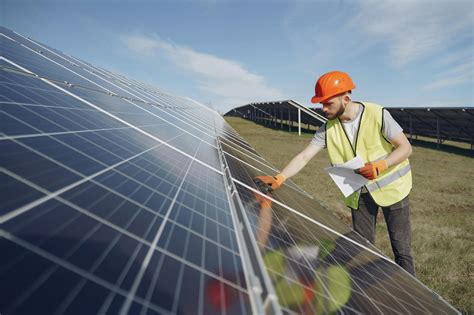As the world shifts towards a more sustainable future, the demand for renewable energy sources has never been higher. Among the various technologies driving this transformation, solar energy stands out as a beacon of hope. At the forefront of this revolution are solar technicians, skilled professionals who design, install, and maintain solar panel systems. Their work not only contributes to a cleaner environment but also fosters economic growth and energy independence.
The rise of solar energy can be attributed to its numerous benefits, including reduced greenhouse gas emissions, lower operational costs, and increased energy self-sufficiency. As governments and companies continue to invest in solar infrastructure, the need for skilled solar technicians has grown exponentially. These technicians play a vital role in ensuring that solar panel systems operate at maximum efficiency, providing reliable and sustainable energy solutions.
What is a Solar Technician?
A solar technician, also known as a solar panel installer, is a trained professional responsible for the installation, maintenance, and repair of solar panel systems. Their primary goal is to ensure that these systems function optimally, converting sunlight into electricity with maximum efficiency. Solar technicians work on both residential and commercial projects, collaborating with architects, engineers, and electricians to design and implement solar energy solutions.
Their duties include:
- Conducting site assessments to determine the feasibility of solar panel installations
- Designing and installing solar panel systems, including electrical connections and mounting hardware
- Testing and inspecting solar panel systems to ensure proper functioning
- Performing routine maintenance and repairs to optimize system efficiency
- Troubleshooting issues and resolving problems related to solar panel performance
The Importance of Solar Technicians in the Renewable Energy Sector
As the world transitions towards a more sustainable energy mix, solar technicians play a crucial role in driving this change. Their expertise ensures that solar panel systems operate efficiently, providing reliable and clean energy solutions. By promoting the adoption of solar energy, solar technicians contribute to:
- Reduced greenhouse gas emissions and mitigating climate change
- Energy independence and security through decentralized power generation
- Economic growth and job creation in the renewable energy sector
- Improved air quality and public health through reduced pollution

Types of Solar Technicians
The solar industry encompasses various specializations, each requiring distinct skills and expertise. Some common types of solar technicians include:
-
Photovoltaic (PV) Technicians
PV technicians focus on the installation and maintenance of solar panel systems that convert sunlight into electricity. They work on both residential and commercial projects, ensuring that PV systems operate efficiently and safely.
-
Solar Thermal Technicians
Solar thermal technicians specialize in the installation and maintenance of solar water heating systems. These systems use sunlight to heat water for various applications, including residential and commercial use.
-
Solar Panel Engineers
Solar panel engineers design and develop solar panel systems, ensuring that they meet specific energy requirements and operate efficiently. They often work on large-scale commercial and industrial projects, collaborating with architects and engineers to integrate solar energy solutions into building designs.
The Skills and Qualifications Required to Become a Solar Technician
To pursue a career as a solar technician, individuals typically require:
- A high school diploma or equivalent
- Completion of a training program in solar panel installation and maintenance (certifications or associate's degrees)
- Physical stamina and ability to work at heights
- Strong understanding of electrical systems and circuits
- Excellent problem-solving and analytical skills
- Ability to work independently and as part of a team

The Future of Solar Energy and Solar Technicians
As the world continues to transition towards a more sustainable energy mix, the demand for solar energy solutions is expected to grow exponentially. Solar technicians will play a vital role in driving this growth, ensuring that solar panel systems operate efficiently and providing reliable energy solutions.
Emerging trends and technologies, such as:
- Bifacial solar panels that can harness energy from both sides
- Perovskite solar cells that offer higher efficiency rates
- Building-integrated photovoltaics (BIPV) that integrate solar panels into building designs
will continue to shape the solar industry, presenting new opportunities and challenges for solar technicians.
Challenges and Opportunities for Solar Technicians
Despite the growing demand for solar energy solutions, solar technicians face several challenges, including:
- Intermittent energy sources and grid integration
- High upfront costs and financing barriers
- Competition from fossil fuels and other renewable energy sources
However, these challenges also present opportunities for innovation and growth, such as:
- Developing more efficient and cost-effective solar panel systems
- Improving energy storage solutions to address intermittency
- Expanding solar energy access to underserved communities






Conclusion
As the world continues to transition towards a more sustainable energy mix, solar technicians play a vital role in driving this change. Their expertise ensures that solar panel systems operate efficiently, providing reliable and clean energy solutions. As the demand for solar energy solutions grows, solar technicians will continue to innovate and adapt, addressing the challenges and opportunities presented by emerging trends and technologies.
We invite you to share your thoughts on the future of solar energy and the role of solar technicians in driving this transition. Join the conversation and help shape the future of renewable energy.
What is the average salary of a solar technician?
+The average salary of a solar technician varies depending on location, experience, and industry. According to the Bureau of Labor Statistics, the median annual salary for solar photovoltaic installers was $44,890 in May 2020.
What kind of training do solar technicians need?
+Solar technicians typically require completion of a training program in solar panel installation and maintenance, such as a certification or associate's degree. Many community colleges and vocational schools offer programs in solar energy technology.
What are the job prospects for solar technicians?
+According to the Bureau of Labor Statistics, employment of solar photovoltaic installers is projected to grow 69% from 2020 to 2030, much faster than the average for all occupations.
